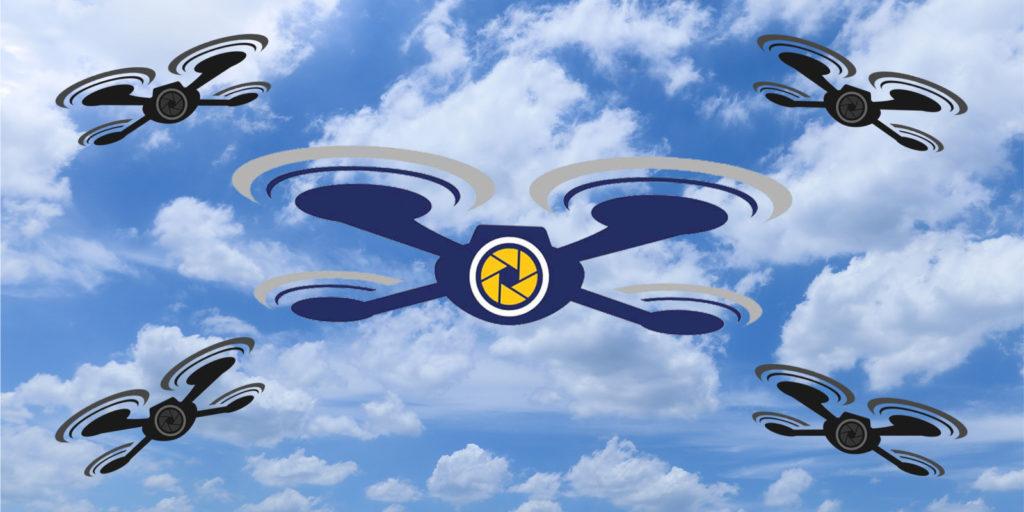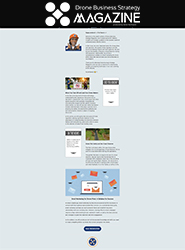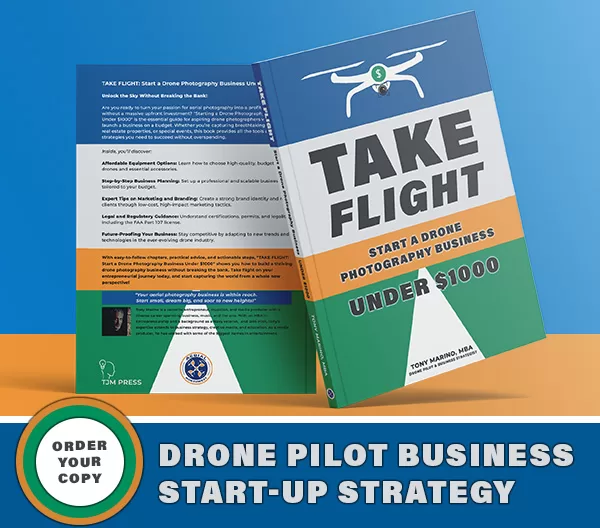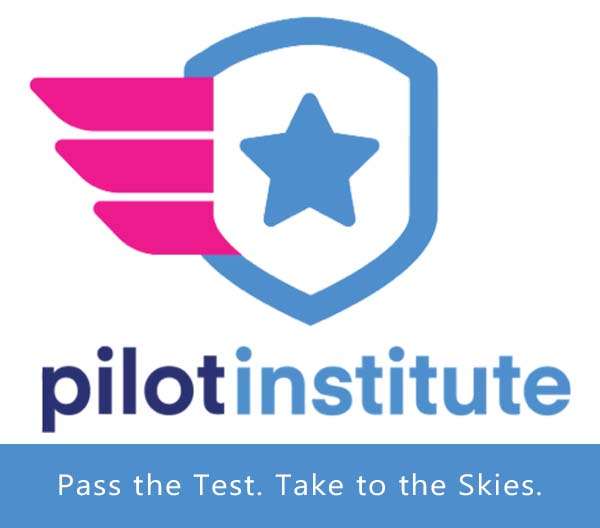
“Always stay one step ahead of your competition – three steps would be even better!” As the commercial drone industry continues to grow, it becomes increasingly important for drone pilots to differentiate themselves from their competitors. By implementing effective differentiation strategies, drone pilots can stand out in a crowded marketplace, attract more clients, and increase their profitability.
In this article, we will explore 10 strategies that commercial drone pilots can implement to set themselves apart from their competition and differentiate their services. From prioritizing safety and compliance to establishing a distinctive visual identity, these strategies can help drone pilots establish a competitive edge and achieve long-term success in the industry.
Drone Pilot Differentiation Strategy
Here are 10 strategies that a commercial drone pilot can implement to set themselves apart from the competition and differentiate their services:
- Specialize in a specific industry or application of drone technology, such as agriculture, construction, or cinematography.
- Prioritize safety and compliance by investing in the latest technology and adhering to strict safety protocols.
- Develop partnerships with businesses and organizations in their target industry to provide customized solutions for their specific needs.
- Create a strong online presence and showcase their expertise and accomplishments through social media and a professional website.
- Offer value-added services such as data analysis or customized reporting to provide additional insights for clients.
- Build a strong reputation through positive reviews and testimonials from satisfied clients.
- Focus on excellent customer service by responding promptly to inquiries and delivering high-quality work.
- Provide competitive pricing and flexible options to meet the needs of clients with varying budgets and project requirements.
- Continuously improve skills and knowledge through ongoing training and education to stay up-to-date with the latest technology and trends.
- Establish a distinctive visual identity through branding and marketing efforts to stand out in a crowded marketplace.
1 | Specialize in a Specific Industry or Application of Drone Technology
Specializing in a specific industry or application of drone technology is a highly effective differentiation strategy for commercial drone pilots. By focusing on a particular niche, pilots can develop specialized skills and knowledge that sets them apart from generalist pilots and creates a competitive advantage.
For example, a drone pilot who specializes in agriculture can use drones for crop mapping, yield monitoring, and plant health analysis. They could develop partnerships with agricultural companies and offer customized solutions for their specific needs. The pilot could use the data collected by drones to provide detailed reports and recommendations for farmers to optimize their yields and reduce costs.
Similarly, a drone pilot who specializes in construction could provide services such as site mapping, progress monitoring, and inspection of hard-to-reach areas. They could use drones to provide high-resolution images and video footage that can be used for planning, design, and marketing purposes. This specialized knowledge and expertise could lead to repeat business and referrals from satisfied clients.
Cinematography is another area where drone pilots can specialize. A drone pilot who specializes in cinematography could use drones to capture aerial footage for film and television productions, commercials, and other marketing materials. They could also provide services such as post-production editing and color grading to create a final product that meets the client’s specific requirements.
Specializing in a specific industry or application of drone technology allows commercial drone pilots to provide highly targeted and customized services to clients. By developing specialized skills and knowledge, they can create a competitive advantage and establish themselves as experts in their field.
2 | Prioritize Safety and Compliance
Prioritizing safety and compliance is an essential differentiation strategy for commercial drone pilots. By investing in the latest technology and adhering to strict safety protocols, pilots can establish themselves as responsible and reliable partners for businesses and organizations.
For example, a drone pilot who prioritizes safety and compliance could invest in the latest technology, such as collision avoidance systems and geofencing tools, to reduce the risk of accidents and ensure safe operations. They could also adhere to strict safety protocols, such as pre-flight checklists, regular maintenance and inspections, and emergency procedures, to minimize the risk of equipment failure and other safety hazards.
In addition, pilots who prioritize safety and compliance could obtain the necessary licenses and certifications to operate drones commercially. This includes obtaining a Remote Pilot Certificate from the Federal Aviation Administration (FAA) in the United States or equivalent certifications in other countries. By obtaining these certifications, pilots demonstrate their commitment to safety and compliance and increase their credibility with clients.
Furthermore, pilots who prioritize safety and compliance could develop comprehensive risk management plans and insurance policies to mitigate potential liabilities. This demonstrates to clients that the pilot takes their safety and security seriously and is prepared to handle any unforeseen incidents.
Prioritizing safety and compliance is a critical differentiation strategy for commercial drone pilots. By investing in the latest technology, adhering to strict safety protocols, obtaining necessary licenses and certifications, and developing comprehensive risk management plans and insurance policies, pilots can establish themselves as trusted partners and build a loyal client base.
3 | Develop Partnerships with Businesses and Organizations
Developing partnerships with businesses and organizations in a target industry is an effective differentiation strategy for commercial drone pilots. By establishing these partnerships, pilots can develop a deep understanding of the unique needs and challenges of their target industry and provide customized solutions that address those needs.
For example, a drone pilot who targets the agriculture industry could develop partnerships with local farms or agricultural co-operatives. The pilot could offer customized services such as crop mapping, yield monitoring, and plant health analysis, based on the specific needs of each farm. By understanding the unique challenges faced by each farm, the pilot can provide tailored solutions that increase efficiency and reduce costs.
Similarly, a drone pilot who targets the construction industry could develop partnerships with construction companies or architects. The pilot could offer customized services such as site mapping, progress monitoring, and inspection of hard-to-reach areas, based on the specific needs of each construction project. By understanding the unique challenges faced by each project, the pilot can provide tailored solutions that improve project management and reduce delays.
In addition, pilots who develop partnerships with businesses and organizations in their target industry can build long-term relationships and gain repeat business. By establishing a reputation for providing high-quality and customized services, pilots can become the go-to partner for their target industry.
Developing partnerships with businesses and organizations in a target industry is a highly effective differentiation strategy for commercial drone pilots. By providing customized solutions that address the unique needs and challenges of their partners, pilots can establish themselves as experts in their field and build a loyal client base.
4 | Online Presence and Showcase Expertise and Accomplishments
Creating a strong online presence is an important differentiation strategy for commercial drone pilots. By showcasing their expertise and accomplishments through social media and a professional website, pilots can establish their brand, attract new clients, and differentiate themselves from the competition.
For example, a drone pilot could create a professional website that highlights their services, experience, and qualifications. The website could include a portfolio of past projects, testimonials from satisfied clients, and information about the pilot’s licensing and certifications. This would allow potential clients to learn more about the pilot’s expertise and evaluate whether they are a good fit for their needs.
Social media is another powerful tool that drone pilots can use to showcase their expertise and accomplishments. Platforms such as Instagram and YouTube provide an opportunity to share aerial footage and photographs from past projects, as well as educational content related to drone technology and best practices. By building a following on social media, pilots can increase their visibility and reach a wider audience.
In addition, drone pilots can use online platforms such as LinkedIn and professional drone pilot networks to connect with potential clients and partners. These platforms allow pilots to share their experience and qualifications, as well as build relationships with businesses and organizations in their target industry.
Creating a strong online presence is a highly effective differentiation strategy for commercial drone pilots. By showcasing their expertise and accomplishments through social media and a professional website, pilots can establish their brand, attract new clients, and differentiate themselves from the competition.
5 | Offer Value-Added Services
Offering value-added services such as data analysis or customized reporting is a powerful differentiation strategy for commercial drone pilots. By providing additional insights to clients, pilots can offer a more comprehensive solution and establish themselves as valuable partners.
For example, a drone pilot who specializes in the construction industry could offer value-added services such as 3D mapping, volumetric analysis, and progress reporting. By using specialized software and tools, the pilot could create accurate and detailed maps of construction sites, calculate volumes of materials such as earth or gravel, and provide regular progress reports to project managers. This would help clients make more informed decisions and improve project management.
Similarly, a drone pilot who specializes in the agricultural industry could offer value-added services such as crop analysis, plant health monitoring, and yield mapping. By using specialized sensors and software, the pilot could provide detailed insights into the health and growth of crops, identify potential issues such as pest infestations or nutrient deficiencies, and map yield data to optimize crop management. This would help farmers make more informed decisions and increase their crop yields.
In addition, offering value-added services allows pilots to differentiate themselves from competitors and increase the perceived value of their services. By providing additional insights and data, pilots can establish themselves as experts in their field and build long-term relationships with clients.
Offering value-added services such as data analysis or customized reporting is a highly effective differentiation strategy for commercial drone pilots. By providing additional insights to clients, pilots can offer a more comprehensive solution and establish themselves as valuable partners in their target industry.
6 | Build Reputation
Building a strong reputation through positive reviews and testimonials from satisfied clients is an effective differentiation strategy for commercial drone pilots. By establishing a track record of success and customer satisfaction, pilots can build credibility and differentiate themselves from the competition.
For example, a drone pilot who specializes in real estate photography could ask satisfied clients to leave positive reviews on websites such as Yelp or Google My Business. These reviews could highlight the pilot’s professionalism, attention to detail, and ability to capture stunning aerial photographs. By building a collection of positive reviews, the pilot can establish a reputation for providing high-quality services and increase the likelihood of attracting new clients.
Similarly, a drone pilot who specializes in construction progress monitoring could ask satisfied clients to provide testimonials for use on their website or marketing materials. These testimonials could highlight the pilot’s ability to provide accurate and timely progress reports, as well as their responsiveness and professionalism. By showcasing these testimonials, the pilot can establish a reputation for being a reliable and trustworthy partner in the construction industry.
In addition, building a strong reputation through positive reviews and testimonials can lead to word-of-mouth referrals and repeat business. Clients who have had a positive experience working with a pilot are more likely to recommend them to others in their industry, which can lead to new business opportunities and a broader client base.
Building a strong reputation through positive reviews and testimonials is a highly effective differentiation strategy for commercial drone pilots. By establishing a track record of success and customer satisfaction, pilots can build credibility and differentiate themselves from the competition, leading to increased business opportunities and long-term success.
7 | Focus On Excellent Customer Service
Focusing on excellent customer service by responding promptly to inquiries and delivering high-quality work is an effective differentiation strategy for commercial drone pilots. By prioritizing customer satisfaction, pilots can build strong relationships with clients and differentiate themselves from competitors.
For example, a drone pilot who specializes in aerial surveys for land development could prioritize customer service by responding promptly to inquiries, providing detailed proposals, and delivering high-quality work on time and within budget. By communicating clearly and consistently with clients throughout the project, the pilot can build trust and establish a reputation for being a reliable and responsive partner.
Similarly, a drone pilot who specializes in cinematography could prioritize customer service by providing personalized attention to each project, taking the time to understand the client’s vision and goals, and delivering high-quality footage that exceeds expectations. By going above and beyond to ensure the client’s satisfaction, the pilot can establish a reputation for being a creative and collaborative partner in the film industry.
In addition, focusing on excellent customer service can lead to repeat business and referrals. Clients who have had a positive experience working with a pilot are more likely to return for future projects and recommend the pilot to others in their industry.
Focusing on excellent customer service by responding promptly to inquiries and delivering high-quality work is a highly effective differentiation strategy for commercial drone pilots. By prioritizing customer satisfaction, pilots can build strong relationships with clients and differentiate themselves from competitors, leading to increased business opportunities and long-term success.
8 | Competitive Pricing and Flexible Options
Providing competitive pricing and flexible options to meet the needs of clients with varying budgets and project requirements is an effective differentiation strategy for commercial drone pilots. By offering pricing and service options that are tailored to individual clients, pilots can attract a broader range of clients and differentiate themselves from competitors.
For example, a drone pilot who specializes in agricultural surveys could offer flexible pricing based on the size of the land being surveyed and the frequency of surveys required. By offering a range of pricing options, the pilot can appeal to both large and small agricultural businesses and differentiate themselves from competitors who offer a one-size-fits-all pricing model.
Similarly, a drone pilot who specializes in real estate photography could offer a range of pricing and service options, such as aerial photography and videography packages, virtual tours, and customized marketing materials. By providing a range of options, the pilot can appeal to clients with varying budgets and project requirements, and differentiate themselves from competitors who offer a limited range of services.
In addition, providing competitive pricing and flexible options can lead to repeat business and referrals. Clients who are satisfied with the pilot’s pricing and services are more likely to return for future projects and recommend the pilot to others in their industry.
Providing competitive pricing and flexible options to meet the needs of clients with varying budgets and project requirements is a highly effective differentiation strategy for commercial drone pilots. By offering pricing and service options that are tailored to individual clients, pilots can attract a broader range of clients and differentiate themselves from competitors, leading to increased business opportunities and long-term success.
9 | Continuously Improve Skills and Knowledge
Continuously improving skills and knowledge through ongoing training and education is an effective differentiation strategy for commercial drone pilots. By staying up-to-date with the latest technology and trends, pilots can offer clients the most advanced and innovative solutions, while also differentiating themselves from competitors who may not be as knowledgeable or skilled.
For example, a drone pilot who specializes in search and rescue operations could continuously improve their skills and knowledge through ongoing training and education in the latest search and rescue techniques, as well as the latest drone technology and software. By staying current with the latest technology and trends, the pilot can offer clients the most effective and efficient search and rescue services, and differentiate themselves from competitors who may not have the same level of expertise.
Similarly, a drone pilot who specializes in construction site surveys could continuously improve their skills and knowledge through ongoing training and education in the latest surveying techniques, as well as the latest drone technology and software. By staying up-to-date with the latest technology and trends, the pilot can offer clients the most accurate and comprehensive surveys, and differentiate themselves from competitors who may not have the same level of expertise.
In addition, continuously improving skills and knowledge can lead to innovation and new business opportunities. Pilots who are knowledgeable about the latest technology and trends are more likely to identify new applications for drone technology and develop innovative solutions for clients.
Continuously improving skills and knowledge through ongoing training and education is a highly effective differentiation strategy for commercial drone pilots. By staying up-to-date with the latest technology and trends, pilots can offer clients the most advanced and innovative solutions, while also differentiating themselves from competitors and opening up new business opportunities.
10 | Establish Distinctive Visual Identity
Establishing a distinctive visual identity through branding and marketing efforts is an effective differentiation strategy for commercial drone pilots. By developing a unique brand identity and visually appealing marketing materials, pilots can stand out in a crowded marketplace and differentiate themselves from competitors.
For example, a drone pilot who specializes in aerial photography could establish a distinctive visual identity by developing a unique logo, color palette, and visual style that is consistent across all marketing materials, including their website, social media accounts, and printed materials. By creating a strong and consistent visual identity, the pilot can create a strong brand that is easily recognizable and memorable, and differentiate themselves from competitors who may have a less distinctive visual identity.
Similarly, a drone pilot who specializes in construction site inspections could establish a distinctive visual identity by developing a unique logo, color palette, and visual style that reflects the precision and accuracy of their work. By creating a visually appealing brand that is consistent across all marketing materials, the pilot can differentiate themselves from competitors who may not have put as much effort into developing their brand identity.
In addition, establishing a distinctive visual identity can lead to increased brand awareness and recognition, as well as more business opportunities. Clients who are impressed by the pilot’s brand identity are more likely to remember them when they need drone services, and recommend them to others in their industry.
Establishing a distinctive visual identity through branding and marketing efforts is a highly effective differentiation strategy for commercial drone pilots. By developing a unique brand identity and visually appealing marketing materials, pilots can stand out in a crowded marketplace, differentiate themselves from competitors, and attract more business opportunities.
The Takeaway
In a competitive market, standing out as a commercial drone pilot can be challenging. By implementing these 10 strategies, you can differentiate yourself from the competition and position yourself as a leader in your industry. From specializing in a specific area to providing exceptional customer service and continuously improving your skills, these strategies can help you attract and retain clients, build a strong reputation, and ultimately grow your business.
Be smart, safe, and forever fly!
If you have any questions, let us know! If you’d like to hire us, you can get more information here.
Written by: Tony Marino, MBA – FAA Certified Part 107 Commercial Drone Pilot and Chief Business Strategist at Aerial Northwest
Frequently Asked Questions
References
Holt, K. (2019). Differentiation Strategy: Winning Customers by Being Different. Wiley.
Porter, M. E. (1998). Competitive strategy: Techniques for analyzing industries and competitors. Free Press; Illustrated edition.
Disclaimer: The information provided in this blog post is for general informational purposes only and should not be construed as legal advice.

DRONE BUSINESS STRATEGY MAGAZINE
A free digital publication made exclusively for all small business drone pilots to them help start-up, become profitable while sustaining a competitive advantage within the drone service industry sector they opt to serve.
“If you love to fly, we’d love to have you come aboard!”
We share your information with no one. Our Privacy Policy.









Leave a Reply
Your email is always safe with us.